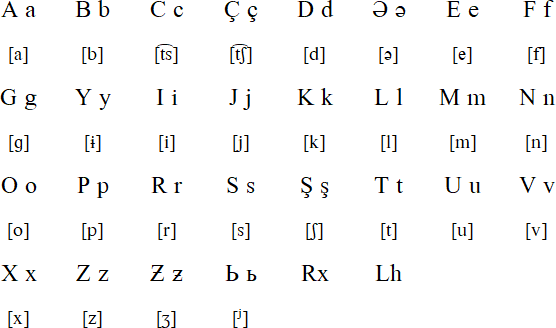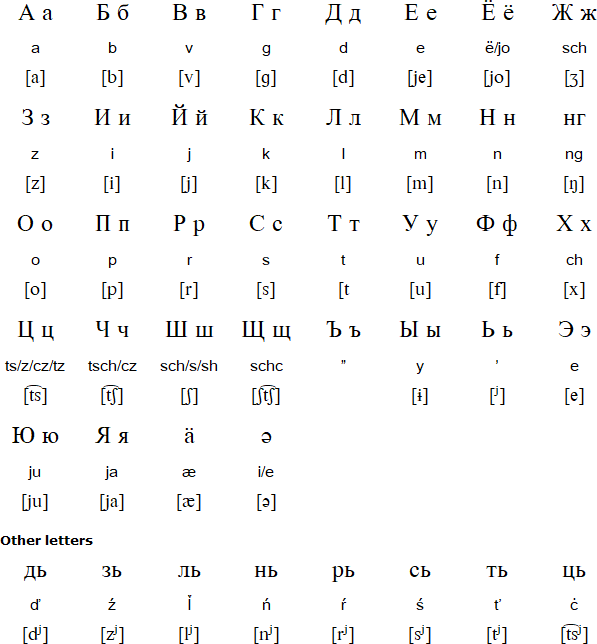Erzya is a member of the Mordvinic branch of the Uralic language family. It is spoken in the Republic of Mordovia in the west of the Russian Federation, and in nearby areas of Nizhny Novgorod, Chuvashia, Penza, Samara, Saratov, Orenburg, Ulyanovsk, Tatarstan and Bashkortostan. There are also speakers of Erzya in Kazakhstan, Uzbekistan, Tajikistan, Kyrgyzstan and Turkmenistan, Belarus, Ukraine, Azerbaijan and Armenia.
There are about 300,000 Erzya speakers in the Russian Federation, and another 253,000 in other countries, particularly Kazakhstan (18,000), Uzbekistan (14,600), Tajikistan (8,800), Kyrgyzstan (5,390) and Turkmenistan (3,200) [source].
The language is also known as Erza-Mordvin, Erzia, Erzya Mordva, Erzya Mordvin, Mordva, Mordvin, Mordvin-Erzya or Mordvinian. The native name is эрзянь кель (erzänj kelj) [ˈerʲzʲanʲ ˈkelʲ].
Erzya is spoken by adults and children, although children speak it mainly with their elderly relatives.
Erzya and Moksha (мокшень кяль), a closely related though mutually unintelligible language, are collectively known as Mordvin. These languages have co-official status with Russian in the Republic of Mordovia. A standarised spelling system for Erzya started to take shape during the 1920s using the Cyrillic alphabet.
In 1932 a version of the Latin alphabet was adopted for Erzya, and this was slightly modified later that year. Later the Cyrillic alphabet was reintroduced.
Erzya was first documented in 1692 by Nicolaas Witsen (1641-1717), a Dutch statesman, writer and cartographer, who listed some 300 words in Erzya. Other words lists and texts and books in Erzya were published in the 18th and 19th centuries using various spelling systems based on the Cyrillic and Latin alphabets.
In 1932 a version of the Latin alphabet was adopted for Erzya in some areas, and this was slightly modified later that year. The Cyrillic alphabet continued to be used in other areas.


Download an alphabet chart for Erzya (Excel)
есе ломантне чачить олякс ды правасост весе вейкетекс. Сынст улить превест-чарьксчист ды визькстэ чарькодемаст, вейке-вейкень коряс прясь тенст ветяма братонь ёжо марто.
Source: https://myv.wikipedia.org/wiki/Ломанень_прават
Vese lomantne tschatschit’ oljaks dy pravasost vese vejketeks. Synst ulit’ prevest-tschar’kstschist dy viz’kste tschar’kodemast, vejke-vejken’ korjas prjas’ tenst vetjama braton’ jozho marto.
All human beings are born free and equal in dignity and rights. They are endowed with reason and conscience and should act towards one another in a spirit of brotherhood.
(Article 1 of the Universal Declaration of Human Rights)
Information about Erzya | Phrases | Numbers | Tower of Babel
Information about the Erzya language and people
http://en.wikipedia.org/wiki/Erzya_language
https://fr.wikipedia.org/wiki/Erzya
https://ru.wikipedia.org/wiki/Мордовская_письменность
http://www.suri.ee/eup/mordvins.html
http://members.tripod.com/Daniel_Kravin/mordvinb.htm
http://www.suri.ee/inf/erzaen.html
https://www.ethnologue.com/language/myv
Erzya phrases
http://www.travelphrases.info/languages/erzya.htm
https://turizmrm.ru/en/translator/
Abaza, Abkhaz, Adyghe, Aghul, Akhvakh, Akkala Sámi, Aleut, Altay, Alyutor, Andi, Archi, Assyrian / Neo-Assyrian, Avar, Azeri, Bagvalal, Balkar, Bashkir, Belarusian, Bezhta, Bosnian, Botlikh, Budukh, Bulgarian, Buryat, Chamalal, Chechen, Chelkan, Chukchi, Chulym, Chuvash, Crimean Tatar, Dargwa, Daur, Dolgan, Dungan, Enets, Erzya, Even, Evenki, Gagauz, Godoberi, Hinukh, Hunzib, Ingush, Interslavic, Itelmen, Juhuri, Kabardian, Kaitag, Kalderash Romani, Kalmyk, Karaim, Karakalpak, Karata, Karelian, Kazakh, Ket, Khakas, Khanty, Khinalug, Khorasani Turkic, Khwarshi, Kildin Sámi, Kili, Komi, Koryak, Krymchak, Kryts, Kubachi, Kumandy, Kumyk, Kurdish, Kyrgyz, Lak, Lezgi, Lingua Franca Nova, Lithuanian, Ludic, Macedonian, Mansi, Mari, Moksha, Moldovan, Mongolian, Montenegrin, Nanai, Negidal, Nenets, Nganasan, Nivkh, Nogai, Old Church Slavonic, Oroch, Orok, Ossetian, Pontic Greek, Romanian, Rushani, Russian, Rusyn, Rutul, Selkup, Serbian, Shor, Shughni, Siberian Tatar, Sirenik, Slovio, Soyot, Tabassaran, Tajik, Talysh, Tat, Tatar, Teleut, Ter Sámi, Tindi, Tofa, Tsakhur, Tsez, Turkmen, Tuvan, Ubykh, Udege, Udi, Udmurt, Ukrainian, Ulch, Urum, Uyghur, Uzbek, Veps, Votic, Wakhi, West Polesian, Xibe, Yaghnobi, Yakut, Yazghulami, Yukaghir (Northern / Tundra), Yukaghir (Southern / Kolyma), Yupik (Central Siberian)
Languages written with the Latin alphabet
Page last modified: 29.12.22
[top]
You can support this site by Buying Me A Coffee, and if you like what you see on this page, you can use the buttons below to share it with people you know.

If you like this site and find it useful, you can support it by making a donation via PayPal or Patreon, or by contributing in other ways. Omniglot is how I make my living.
Note: all links on this site to Amazon.com, Amazon.co.uk
and Amazon.fr
are affiliate links. This means I earn a commission if you click on any of them and buy something. So by clicking on these links you can help to support this site.
[top]